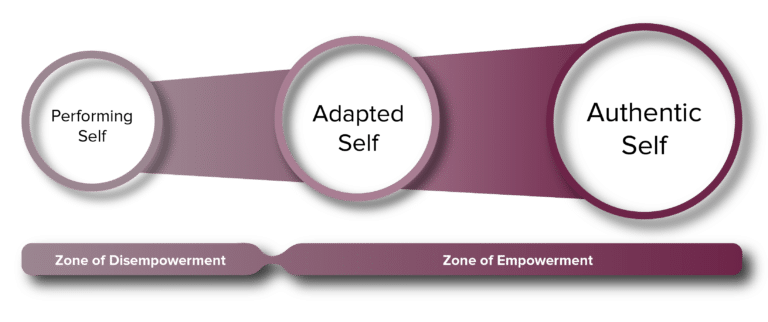Leverage the Seven Behavioral Dimensions to
Cultivate Belonging at Work

As you may know, we’re huge advocates for cultivating belonging in the workplace for a myriad of reasons. I also feel this way on a personal note – it’s critical that we stand in our power to claim belonging in how we work and lead to experience workplace joy. But as I share in both of my books, We’ve Got This and The Authenticity Principle, I didn’t always feel a sense of belonging and like the empowered, fiercely authentic leader I am now!
Before authenticity transformed the way I live, work, and lead, I often felt like I was “performing” (i.e. acting out a persona) in so many areas of my life, but especially in the workplace. It had a profound impact on how I spoke, dressed, emoted, communicated, and engaged at work. I knew that I wasn’t experiencing belonging at work, but I didn’t know how to reveal my Authentic Self!
Digging deep into using the Three Selves Framework™ literally changed my life. I’ve already told you about a lot about the Three Selves Framework™ in previous blogs – so in this post, I want to focus on what I call the Seven Behavioral Dimensions.

Understanding the Concept of the Seven Behavioral Dimensions
All of the decisions we make to reveal or suppress our authenticity are connected to the Seven Behavioral Dimensions, which are the seven key areas in which we make decisions on how to behave, both consciously and unconsciously: from how we choose to wear our hair at work, what we share about our personal lives, the words we use, to how we express ourselves.
By reflecting on each of the Seven Behavioral Dimensions, you’ll develop a better understanding of the extent to which you’re bringing your Authentic Self to work. But this will also help you reflect on how your actions are impacting your team members’ ability to be authentic – all which helps to unlock belonging for yourself and create a positive work environment for others.
Highlighting the Seven Behavioral Dimensions
Here’s a brief breakdown of each of the seven dimensions (more detailed information can be found in my book The Authenticity Principle):
- How we express our emotions: this dimension reflects the extent to which we are restrained or expressive in how we express ourselves across a range of emotions: anger, fear, disgust, happiness, sadness, surprise, contempt, shame, and pride.
- How we communicate non-verbally: this dimension covers how we behave in areas like gesturing, touching, posture, facial expressions, eye contact, and what I call “eye talk” (blinking, squinting, widening, closing, rolling, “smizing,” glaring, etc.).
- The words we use when we speak: this dimension includes whether we speak formally or informally; what vocabulary we choose (e.g., using simple words as opposed to bigger, fancier, less commonly used words); whether we use slang, swear words, or offensive language.
- How we speak: this dimension reflects the pitch, volume, pace, accent, and intonation of our voice.
- Our appearance: this dimension reflects how we choose to physically present ourselves, including our clothing, shoes, makeup, hairstyle, weight, cosmetic procedures/plastic surgery, jewelry, piercings, tattoos, accessories, style, brand affiliation, and the colors we wear.
- The content we share: this dimension includes what we put forward about our values, beliefs, thoughts, ideas, opinions, dissenting views, stories, experiences, and cultural differences – which, broadly defined, includes our nationality, race/ethnoculture, religion/faith, gender identity, sexual orientation, age, disability, class/socioeconomic status, and family status.
- Our actions: this dimension covers the countless decisions we make every day about how we act, including the choices we make about how to treat people, whom to speak to, whom to avoid, how we self-promote, whose interests we prioritize, how and whom we defer to, how and whom we dominate, how we listen, what we say yes/no/maybe to, and how and where we draw our boundaries.
To live more authentically, you want to reflect on your behavioral preferences across these areas. In looking at the Seven Behavioral Dimensions, ask yourself:
- How does my Authentic Self want to behave?
- What does my Adapted Self look like?
- Where is my Performing Self showing up?
Used together, the Seven Behavioral Dimensions and the Three Selves Framework™ will help you to claim greater belonging.
Reach out to the bci team here to learn more about our range of cutting-edge programming on how to cultivate authenticity and belonging in the workplace.
If you’re looking for more authenticity and belonging related resources, check out:
- bci’s dedicated playlist: Cultivating Authenticity and Belonging
- bci’s tip sheet: Cultivating Belonging in the Workplace
- bci’s blog page
- Article: Authenticity: The Transformative Approach to Building Inclusive Environments
- My blog page: Belong to Yourself
- My Belonging Toolkit
- My playlist: Experience Belonging
